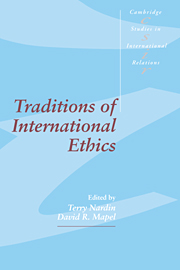Book contents
- Frontmatter
- Contents
- Contributors
- Preface
- 1 ETHICAL TRADITIONS IN INTERNATIONAL AFFAIRS
- 2 THE TRADITION OF INTERNATIONAL LAW
- 3 THE DECLARATORY TRADITION IN MODERN INTERNATIONAL LAW
- 4 CLASSICAL REALISM
- 5 TWENTIETH-CENTURY REALISM
- 6 NATURAL LAW AND INTERNATIONAL ETHICS
- 7 KANT'S GLOBAL RATIONALISM
- 8 UTILITARIANISM AND INTERNATIONAL ETHICS
- 9 THE CONTRACTARIAN TRADITION AND INTERNATIONAL ETHICS
- 10 LIBERALISM AND INTERNATIONAL REFORM
- 11 MARXISM AND INTERNATIONAL ETHICS
- 12 THE IDEA OF RIGHTS IN INTERNATIONAL ETHICS
- 13 BIBLICAL ARGUMENT IN INTERNATIONAL ETHICS
- 14 CONVERGENCE AND DIVERGENCE IN INTERNATIONAL ETHICS
- Index
- Titles in the series
13 - BIBLICAL ARGUMENT IN INTERNATIONAL ETHICS
Published online by Cambridge University Press: 15 September 2009
- Frontmatter
- Contents
- Contributors
- Preface
- 1 ETHICAL TRADITIONS IN INTERNATIONAL AFFAIRS
- 2 THE TRADITION OF INTERNATIONAL LAW
- 3 THE DECLARATORY TRADITION IN MODERN INTERNATIONAL LAW
- 4 CLASSICAL REALISM
- 5 TWENTIETH-CENTURY REALISM
- 6 NATURAL LAW AND INTERNATIONAL ETHICS
- 7 KANT'S GLOBAL RATIONALISM
- 8 UTILITARIANISM AND INTERNATIONAL ETHICS
- 9 THE CONTRACTARIAN TRADITION AND INTERNATIONAL ETHICS
- 10 LIBERALISM AND INTERNATIONAL REFORM
- 11 MARXISM AND INTERNATIONAL ETHICS
- 12 THE IDEA OF RIGHTS IN INTERNATIONAL ETHICS
- 13 BIBLICAL ARGUMENT IN INTERNATIONAL ETHICS
- 14 CONVERGENCE AND DIVERGENCE IN INTERNATIONAL ETHICS
- Index
- Titles in the series
Summary
Despite the popular tendency to appeal to the Judeo-Christian tradition as if it were a univocal source of moral teaching, the traditions that draw upon the scriptures of the Hebrew Bible, the Apocrypha, and the New Testament are irreducibly diverse. This is not to say that the Bible cannot be interpreted as a whole, and indeed the history of biblical interpretation is full of attempts to offer a pattern of relationship between the books of the Bible. But all such uses of Scripture are “imaginative construals” (Kelsey 1975, 103; Verhey 1984, 159, 232) of the text of the Bible in the service of some community (Birch and Rasmussen 1989, 141).
Within the diversity of traditions emanating from the Hebrew and Christian Scriptures, an ongoing argument about international issues has arisen among the living traditions that trace their origins to the writings of the Hebrew and Christian canons. Biblical argument also takes place within and among communities in which the Bible may not have religious and moral authority. For the latter, the Bible is a cultural document; for others it is “the Torah from Heaven” or the “Word of God” or “the Book of the Church.” Among these diverse communities, no single tradition of biblical argument in international ethics has emerged. This chapter will discuss eight different uses of the Bible that correspond to different traditions of international ethics.
- Type
- Chapter
- Information
- Traditions of International Ethics , pp. 270 - 296Publisher: Cambridge University PressPrint publication year: 1992
- 1
- Cited by



